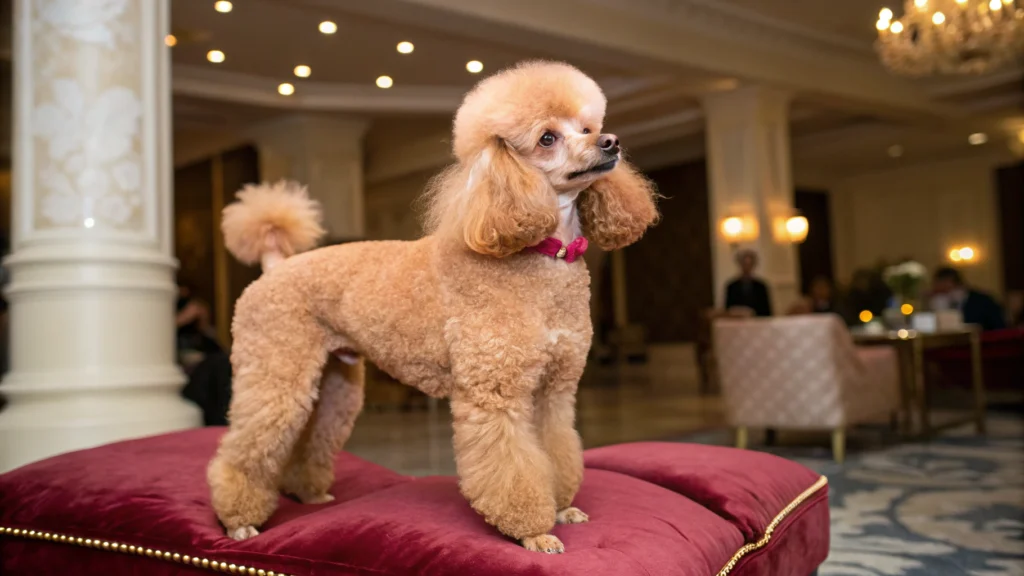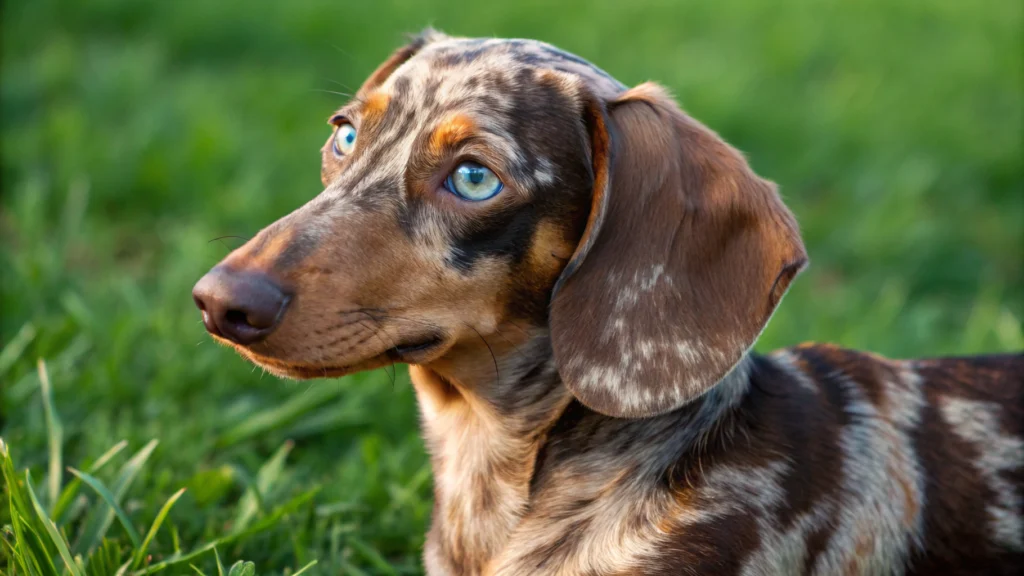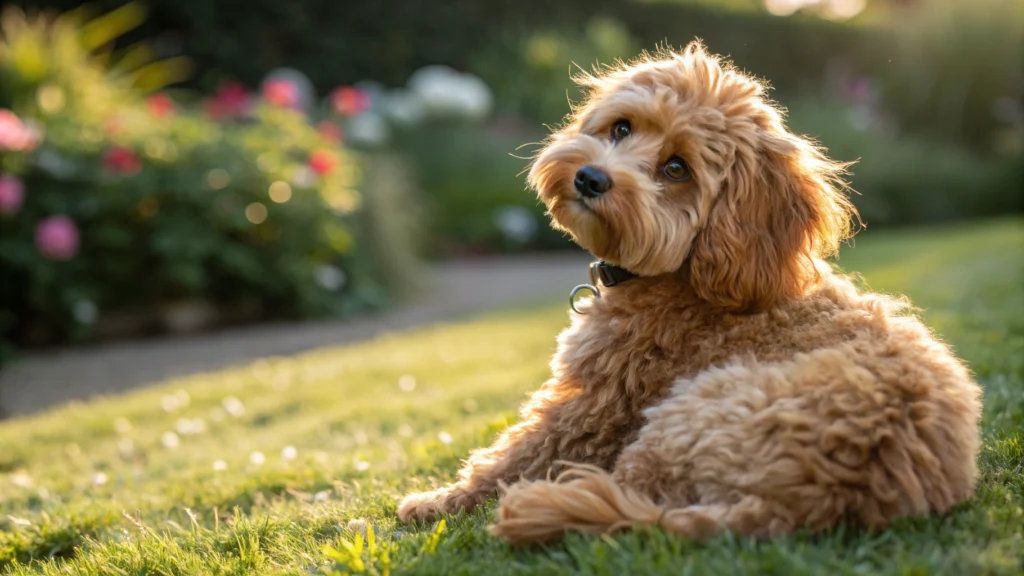
Teacup Poodle Overview
What are Teacup Poodles?
Teacup poodles are small. They capture people’s hearts with their small size! This breed is small, measuring at under 9 inches and weighing 2-4 pounds. The teacup poodle is just elegance in a small package! The teacup poodle is different than standard size poodles, because they are bred different based solely on their size. As you can tell teacup poodles appear to be fragile, but they have a lot of energy and are fun additions to the poodle family.
Origins and Breeding of Teacup Poodles
Teacup poodles are the product of selective breeding in the 20th century, when the demand for a smaller companion dog led to selective breeding by pairing standard poodles that are smaller than average. Breeders need to be careful with teacup poodles because the smaller you go there is the chance for complications. Teacup poodles are a variant of poodles of nobles from Europe, where poodles were highly regarded for their elegance and intelligence.
Why are Teacup Poodles Gaining Popularity?
Teacup poodles have become widely popular and they can be spotted in the arms of many celebrities and city-goers. Their charm and fun size make them a pop culture phenomenon in the city. With social media posting their “cuteness factor,” there is no shortage of pictures available of teacup poodles. The teacup poodle can not only be fun, but it can be elegance and glamour in a small dog!
Physical feature
Size and Stature
The smaller stature of the teacup poodle which is often actually no taller than a ruler, is one of the most recognizable features of this breed. Their lighter construction makes them convenient to carry in your purse or lap. Although they are quite small, they should maintain their proportions giving them a miniature version of their being a poodle which is considered elegant by breed standards.
Coat types
The poodle has a rich dense culy coat that can range from soft apricot to sleek black among the teacup poodles. The hypoallergenic fur often requires maintenance to keep them from matting. There are a varying amount of types including solids and blends. These variations all add to the esthetics of the breed and their owners love the tactile feel of their soft and rich coats.
Distinct facial features
The expressive eyes and refined muzzle and features are also notable physical features of the teacup poodle. Their eyes are often almond shaped which shares a likeness that suggests sight and intelligence. A small nose with an elegant frame adds to their small and dainty demeanor. The coat is well kept and brushed that adds to the overall look for a well-groomed teacup poodle that can sometimes appear doll-like and even cuter to admire.
Temperament and Personality
Intelligence and Trainability
Teacup poodles also have a reputation for being one of the smartest dogs. You can probably teach a teacup poodle a complex command as they learn fast. Their beagle-like intelligence was obtained through selective breeding from standard poodles which can make you as an owner feel like you could train almost anything. They are quick to learn any trick and really need some mental stimulation for any duration of time even that which may seem endless. This is really satisfying for owners know their dog.
Social Behavior
Teacup poodles are social animals, and they love to be with people and develop relationships with their owners. They are social and enjoy people, greeting strangers politely, albeit with some apprehension. A teacup poodle is an excellent pet for those who want a social pet but is demanding of your attention.
Emotional Awareness
Teacup poodles are very responsive to human emotions, mimicking their owner’s state of mind and feelings. This emotional awareness helps them to bond deeply with someone but requires a steady home to avoid anxiety reactions. Their emotional awareness makes them lovable pets for owners who can devote time and attention that can only enhance the value of the teacup poodle as a pet.
Care Basic Elements
Diet
Teacup poodles have very small stomachs and can benefit from a diet specifically created for them. High-quality, small-kibble size food or homemade meals of high protein content can meet their energy requirements. You will have to limit how much you give them with respect to portions to avoid obesity or overweight conditions since there is little capacity for energy storage in such small frames. All feeding amounts should be addressed with a qualified veterinarian.
Grooming
The teacup poodle has lots of requirements around grooming. Regular brushing to avoid tangles needs to be done once a week. The teacup poodle needs to be trimmed by a professional every four to six weeks to maintain their appearance. The teacup poodle also needs their ears cleaned regularly. Dental care is also an important part of their grooming and hygiene.
Exercise and Fitness Levels
Teacup poodles may be small but are very energetic generally. They can meet their exercise expectations with short daily walks and indoor play. Puzzle toys or games that cause them to think keep them engaged and distracted. Teacup poodles should not be over-exercised due to their fragile body structure.
Health Considerations
Commonly Seen Genetic Health Issues
Teacup poodles can experience a variety of health challenges, such as patellar luxation and hypoglycemia. Because of their small stature, they are prone to dental issues and have fragile bones; therefore, the risk of injury can be greater than a large dog. By routinely visiting a veterinarian, they can screen for health issues allowing for early identification if a health issue should arise.
Lifespan Expectations
With proper care, A teacup poodle can live an average of 12-15 years. The longevity of a teacup poodle is strongly advised by diet, exercise, and medical care. Owners also have to be vigilant they do not cause health issues naturally based on their small stature.
Veterinary Care Advice
Routine veterinary visits are important with the teacup poodle. Vaccines, parasite prevention and dentistry, all save their lives. Owners should try to find a veterinarian familiar with toy breeds especially when they don’t have training background or expertise owning a toy breed.
Training and Socialization
Training Strategies
Positive reinforcement is the way to go when training your teacup poodle. Treats and praise give great results, as does consistency. These pups are smart and can learn complicated tricks, but you’ll have to have patience with their sensations, or you may overwhelm them.
Socialization
The best time to introduce new experiences to a developing teacup poodle is when she’s young. Exposure to different people and pets and new locations will normalize changes and help to build confidence in your puppy. Puppy classes and supervised play days with new dogs can also help to enhance the socialization with other dogs, and reduce any timid behavior.
Behavior Quirks
If not trained properly, teacup-poodles can exhibit signs of excessive barking and separation anxiety. These behaviors can be redirected through routine training and mental stimulation. Be sure to address any quirk promptly to keep your home happy.
Living with a Teacup Poodle
Best Home Environmental scenarios
Teacup-poodles are suitable for urban apartments due to their small size. Teacup-poodles do best in calm, loving homes that will lavish them with attention. . It is necessary to have some safe enclosed space for play and to rest away from the house. A small enclosed space makes it easy for them to feel safe and comfortable in a smaller area.
Compatibility with Families and Pets
Teacup-poodles are great for families, but because they are so frail, you should be careful if there are children around. They tend to get along with other pets if they are socialized properly when puppies. Their friendly demeanor ensures they fit in well with family dynamics.
Travel and Portability Benefits
Because of their diminutive size, teacu- poodles make wonderful travel companions. They fit comfortably in a carrier to go anywhere their owner intends to go. Since teacup-poodles don’t seem to mind different environments, they also make great companions for those who travel frequently.
Ethical Breeding and Adoption
Identifying Reputable Breeders
Reputable breeders have the health of the teacup-poodle as their main focus. They will perform genetic testing and provide health documentation without delay. Good breeders will refrain from over-breeding and will share all particulars regarding your teacup-poodle’s care. Taking time to investigate a breeder’s registration (to avoid scams) will help you ethically acquire a healthy puppy.
Adoption Considerations
Adopting a teacup-poodle from shelters or rescues is a great value. Many dogs need loving homes, and adopting means that you are committed to ethical pet ownership and gives you the most potential benefits. Adopters, however, want to know if the teacup-poodle has any health issues and what it is temperamentally like before committing.
Ethical Issues with Teacup Breeders
The pursuit of super-small dogs creates problems that professionals will frown upon. Some breeders will prioritize ultra nutrition and size over health and will produce unhealthy animals. A new teacup-poodle owner should help make a case for responsible breeding and choose a breeder who is responsible and has the health of the teacup-poodle in mind.
You May Like It




